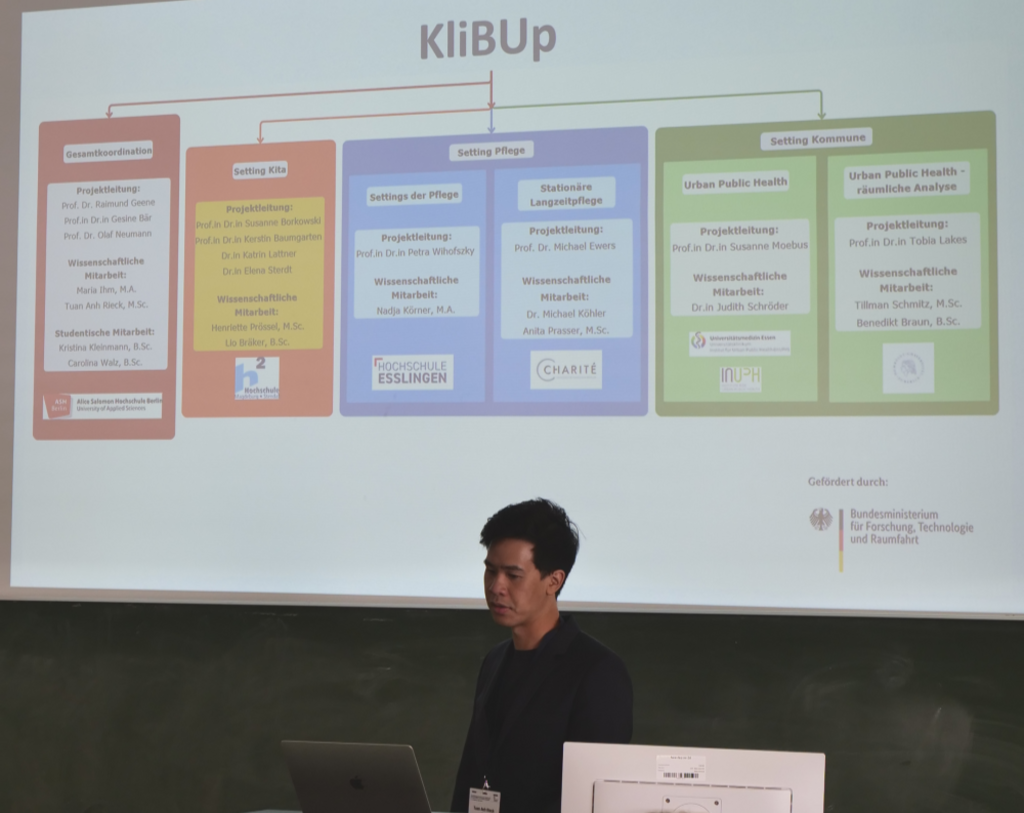At this year's 60th annual conference of the German Society for Social Medicine and Prevention (DGSMP) last September, entitled "Participation and Co-Creation", the research network "Climate Health in Living Environments - Development of Strategies and Action Approaches to Promote Resilience through Bottom-Up Approaches (KliBUp)" provided several in-depth insights into its current work. For example, at the "Climate Health Promotion" pre-conference and as part of the presentation of the six BMFTR-funded research networks on health promotion and climate protection. The objectives and research designs of the individual collaborative projects were outlined, as well as those of the KliBUp research network as a whole.
Climate change is considered to be the greatest public health challenge of the 21st century. It requires comprehensive measures for climate protection (mitigation) and climate adaptation, which should not be decreed "top down" as regulations, but should be developed "bottom up" from the perspective of the users and, if possible, by the users themselves, so that they are tailor-made, actively and sustainably implemented, promote social cohesion and contribute to the empowerment and resilience of institutions and actors.
Certain population groups are particularly affected by the consequences of climate change in terms of their health. These include, for example, people with chronic illnesses or with physical or mental functional impairments, older and very old people, infants and children and pregnant women. There is also an unequal distribution in terms of socio-economic health opportunities. Population groups with a lower socio-economic status (SES) - both globally and regionally and locally - are particularly affected by the consequences of climate change, as they have fewer resources to adapt to climate change and protect themselves from the negative health consequences. Heatwaves, for example, can therefore lead to short- to long-term health problems for these groups of people. Consequently, the living environments of people in the early stages of life (e.g. daycare setting) and at the end of life (e.g. care setting) are of particular importance; furthermore, the municipality as an umbrella setting with the direct task of providing services of general interest and social balance.
This is where the joint research project KliBUp comes in. It comprises a total of six colleges and universities, each of which is implementing its own sub-projects under a common theme. The ASH Berlin / Berlin School of Public Health is responsible for coordinating the project. The project will run for three years from February 1, 2025 and is funded by the Federal Ministry of Research, Technology and Space (BMFTR ).
Specifically, the research association is monitoring and evaluating measures aimed at creating structures that promote climate health in daycare, care and community settings with the help of participatory approaches. The researchers focus in particular on the potentials and limitations of participatory processes. The aim is to identify promoting and inhibiting factors for both individual and collective participation and self-efficacy from the perspective of health promotion according to the setting approach and the community resilience approach. As a result, KliBUp should show how participation can succeed and how the resilience of the selected settings and their actors to climate change can be strengthened.
Project website: www.klibup.de
BMFTR funding line: "Intervention studies for healthy and sustainable living conditions and lifestyles"



